| 'Like' us on Facebook | Follow us: |
Posted on: Mar 25, 2018
A Few Pearls from the Ocean of Ramayana
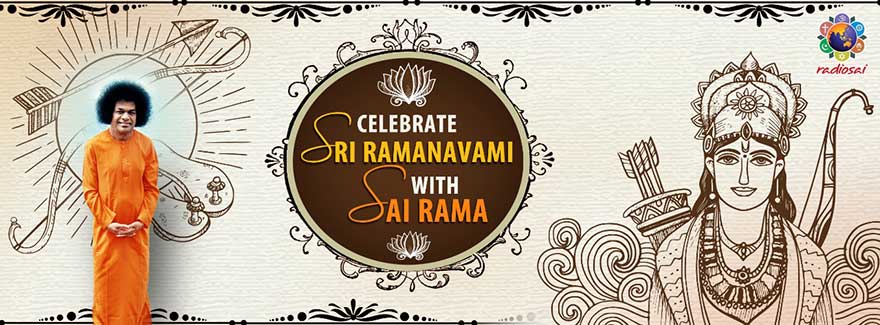 |
The Ramayana is a vast ocean. All the wisdom that one needs to be able to steer this life towards the ultimate goal is hidden deep within this vastness. One may choose to sail on the surface and be entranced by the beauty of the story, the intricate nuances of the plot, the variety of characters and the high drama. But if wisdom is what one seeks, dive deep one must. For as it is said, those that desire the pearl must not skirt the ocean but take a deep plunge. What good fortune is ours, that our Beloved Bhagawan Himself plays the role of a guide even in this pursuit. Time and again, He presents us with a few such pearls of wisdom from the Ramayana, enticing us with their exquisite beauty and alluring us to take the plunge ourselves. As we celebrate the sacred festival of Sri Rama Navami, we wish to share with you a few such pearls that Swami presented to us on many occasions in the past. These are a few, (a very few we must say) episodes from the Ramayana, which may appear so simple that their profundity may have been lost on us casual readers or listeners. But Swami, in His infinite compassion draws our attention to the lessons in these episodes. And those that are truly drawn are sure to be transformed, for the lessons are simple, inspiring and reassuring. We hope you enjoy and also benefit from this recollection.
Rama Nama - Sweeter Than Sweetness
The name Rama is sweeter than sugar and the best of honey.
It is more tasteful than curd too.
As you go on repeating the name of Rama,
it tastes like nectar itself.
Hence, repeat the name of Rama with all your heart,
with utter sincerity.
(Summer Course, May 20, 1996, Evening)
Where You See Beauty Is What You Are
Once upon a time, Sita who was separated from her husband and feeling despondent was in Ashoka Vana. Ravana had decorated the Ashoka Vana beautifully. With the silly belief that if he pleases Sita she would consent and submit, he decorated the Ashoka Vana in many exquisite ways.
But Sita was not deluded to be interested in such trivial, worldly, transient pleasures and beauties. All these are merely demonic feelings. No beauty whatsoever allured her. But, one day, a small monkey, sitting on the tree in Ashoka Vana, started rendering the story of Rama:
Rama, Rama, Rama Sita..
Rama! Born in the Solar dynasty, the One who married Sita
and removed the curse of Ahalya and the One who protects His devotees.
Rama, Rama, Rama Sita..
She heard it and wondered, “Who is this, singing our story in Lanka?” She raised her head and looked up. What beauty does a monkey have? It looks quite ugly. But this monkey looked so beautiful to Sita. Does the beauty lie in the monkey? No, no, no. The beauty for her lies in the chanting of Rama’s name. When she heard the name she was fond of, she was in bliss. Then she said, “Beauty is bliss, and bliss is the nectar of life”. So, the beauty that does not confer bliss is useless. Sita declared, “Rama nama is my bliss and this bliss is beauty for me.” In this manner, the relationship between Anda-Ananda or Beauty and Bliss is expounded in the Ramayana.
So, what made Sita and Rama experience bliss? The welfare of the people gave them bliss. When people followed the path of Sathya and Dharma (Truth and Righteousness), that gave them bliss. They did not expect anything monetary from people. They did not desire for any benefits in return. They always looked after them by giving, giving and giving. This is not only common in those days, but it is also applicable to present times. All Avatars till date are doing the same.
(Summer Course, May 29, 1996)
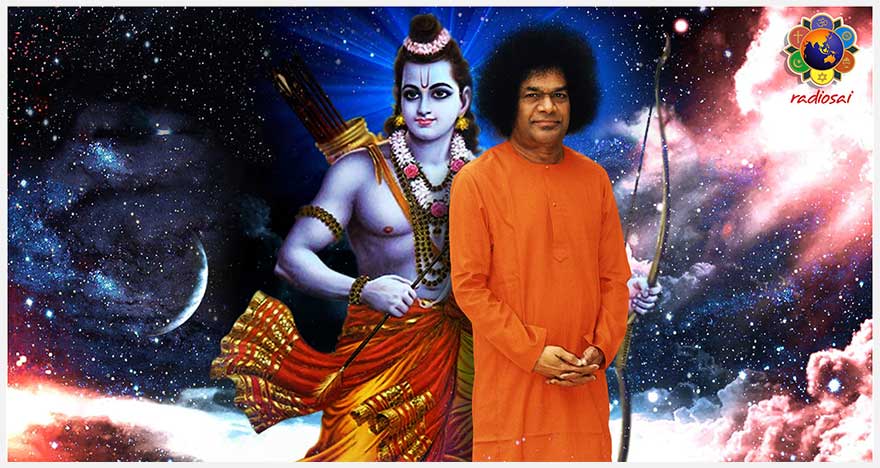 |
Journey To Redemption Starts With Right Aspirations
At a very young age itself, Vibhishana did penance. During the time of penance Brahma manifested and said, “Vibhishana ask what you want.” Kumbhakarna asked for food and sleep. Kumbhakarna actually didn't ask for sleep. In order to be a tough and cruel person he prayed for Nir-daya (a non-compassionate nature). Being a slothful person with a thick toungue, instead of saying Nir-daya, he pronounced it as Niddara (sleep). Brahma said, “So be it” and left. Then he fell asleep. Similarly, Ravana also did penance. Ravana asked he should not die by the hands of gods, celestial beings like Gandharvas and yakshas or beings such as Kimpurushas and Kinnaras. But being a wicked and arrogant person by nature, he considered humans too trivial, and so did not seek that he should not be killed by a man. Seizing that opportunity, Vishnu then decided to come in a human form to put an end to Ravana. Then Ravana recognised and thought thus, “This is a mistake of my own making. I didn’t mention humans at all”. He being a demon, felt human beings are insignificant.
Vibhishana did penance. Brahma said to him, “Son, ask for whatever you want”. Vibhishana replied, “Swami, I don’t want anything. Let me be ever compassionate; sharing this compassion with all let my heart itself become an epitome of compassion; may I lead a life of charity and righteousness. I should become a compassionate one. In no circumstance I should turn into a stone-hearted one. I should melt away in compassion.” He prayed to Brahma to bless him thus. That is why Vibhishana always remained compassionate. Ravana abused him in many ways. Even his own sons caused hurt to him. He never used anger in response for any of it. He handled everything with compassion, and laboured for God's grace. Since he filled his heart with compassion, he was blessed with God's grace too. He also earned proximity to God's feet. Only when man develops Daya (compassion), he would be considered to have Hrudaya (heart). The one without compassion is not human, but a demon. Under no circumstance, we should change this compassionate nature.
(Summer Course, May 26, 1996)
Be Selfless and Noble Like the Tongue
Lanka had many noble souls besides Vibhishana. But cowed down by the wickedness they were rendered helpless. When Hanuman first entered Lanka, Vibhishana confided to the Son of Vayu thus, “Hanuman! I am living a life like a tongue amidst teeth. Whole of Lanka has Rakshasas (demons). Amidst them I am leading a life like a soft tongue. How long should I lead life like this? When would I be blessed with Sri Rama’s grace? When would I get His proximity? I am passing each moment awaiting that golden moment”. Hanuman then gave Vibhishana a profound message: “Vibhishana! Not only for you, in this world, all good people will have around them demons who are like sharp teeth. Be it sages, saints, seers or Avatars, such wicked, demonic people who are like the sharp teeth are to be found around them. One thing you must recognise, the tongue is born with you. Teeth were born later. Which means, the tongue which represents the attributes of piousness, righteousness and nonviolence is born first. Not only this.
The Tongue, which is the knower of taste (Rasagne), is the one which speaks sweetly (Madhura Priyetvam) and the one which speaks truth in a comforting way (Satyam Hitam Tvaam) and also speaks the supreme.
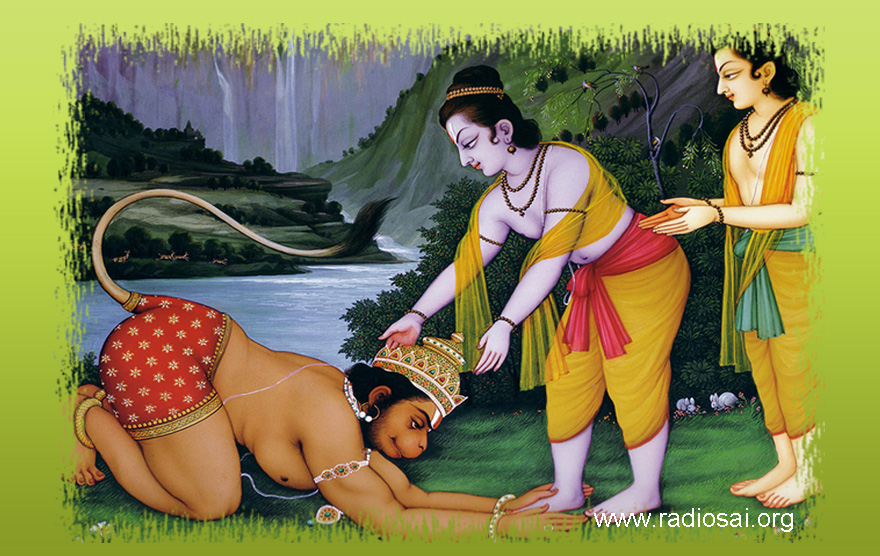 |
The tongue is very sacred and born with human life. It is embedded with sacred qualities. It is very sweet. It speaks and gives form to truth. It is an eternal witness. It takes decisions. It is born with you. It is the quality of noble men. The Tongue symbolises noble souls. The sharp teeth which signify the wicked, harmful and demonic people were born much later. The wicked people always wait and wonder how to harm the tongue. The teeth always hinder the way out for the tongue. But the tongue doesn’t forget and forsake its responsibility. When the lips are dry, it somehow finds a way out and moistens the lips. Similarly, however tough the wicked people make life for the noble ones, they would continue to bring solace to the society by bringing good teachings, and soothe the dryness with their sweet words. Therefore, tongue represents the very form of noblemen. Teeth represents the wicked, demonic and crooked people. They always try to trouble others and they do not help anyone. Such a noble Vibhishana was troubled by these demons.
(Summer Course, May 26, 1996)
Chanting and service go hand in hand
It is useless if one just chants Lord’s name without rendering service. Vibhishana and Hanuman became friends during the search for Sita. Vibhishana lamented to Hanuman, “Hanuman! You are in the divine presence of Rama. You are contemplating on Rama so much so that every hair in your body reverberates with the name of Rama! How lucky you are!! I have been chanting Rama’s name for so many years now, but I have not earned the darshan of Rama.” Hanuman taught him thus: “Vibhishana! You chant the name of Rama like a tape-recorder, but have you participated in service to Rama? Sita has been here for the past ten months; did you at least visit her once? Did you do anything to free her? Is this not Rama’s service? Without doing Rama's work, if you merey chant His name, how can you achieve the principle of Rama? So along with Lord’s name, service is also important.” ‘Name’ is negative, ‘service’ is positive; the current flows only when both the negative and the positive come together. The ‘current’ is our will power. One must make proper use of this will power.
(Divine Discourse, July 19, 1997)
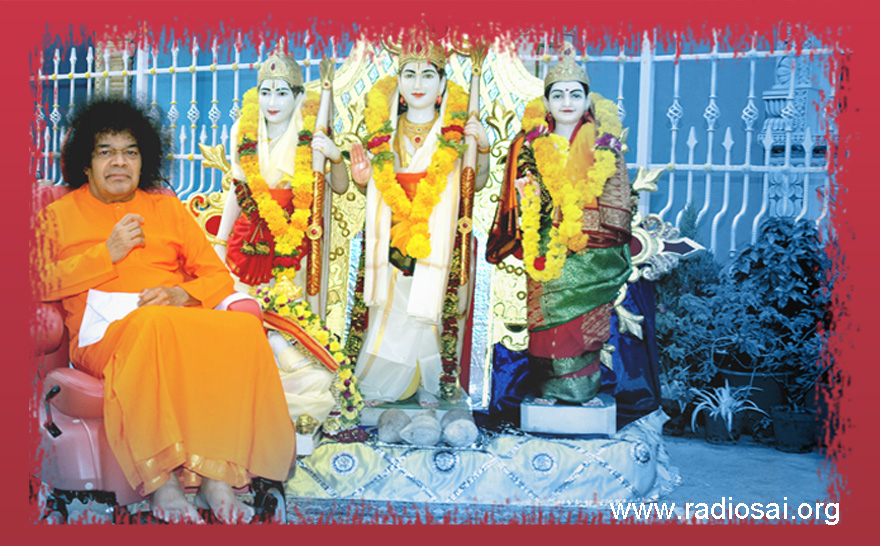 |
When to Delay When Not to Delay
Shot by Rama's arrow Ravana fell to the ground. When there was but few minutes before he gave up his life, many sages approached him. He was a great scientist, a great scholar, a person of great penance. He was all powerful. They wanted to know what was his chief aim in life. They all assembled there and questioned him saying, “Oh Ravana! What is it that you achieved in life? What was your aspiration?” Since he was shot by Rama’s arrow, he was cleansed of all his sins. Noble feelings started blossoming in him. With great difficulty he raised his hands, offered Namaskar and said, “Oh great ones! What should I say. I had so many thoughts. But they did not materialise. But one thing you all must learn from my life. When you get a good thought, you must not procrastinate. You must get into the action immediately. You must not delay or postpone good activities. You shouldn’t take more time to do good. Thought and action must happen in tandem. When you get a bad thought, you must not act on it. Take your own time. I have thought on similar lines. I had a plan to convert the ocean water around Lanka into sweet water. But I kept postponing it. Eventually, I was unable to do it. I thought all those who are suffering in hell must be taken to heaven and given a new life there. I postponed this too. I procrastinated all the noble tasks and now, I am here dying. I am unable to do these good actions. At least all of you, if you get a good thought, get into action and achieve the task. Never waste time for good actions.
(Divine Discourse, Jun 25, 1996)
To Be Grateful is to Be Human
Download
At the time of coronation, the first pronouncement that Rama made was quite unique and remarkable. He said: "If today this auspicious coronation is taking place, who is responsible for it? It is Hanuman who, on number of occasions, helped in searching for Sita and gave information about her to Me and Me to her.” Then Rama said, “First and foremost I express My gratitude to him”.
Secondly, He expressed gratitude to Jatayu, who when Ravana abducted Sita tried to protect her even at the cost of his own life.
Next, Rama expressed gratitude to Sugreeva, who helped Rama by searching for Sita and gathering an army. He next expressed His gratitude to Vibhishana, who Rama trusted even though initially all others saw with suspicion, and who helped Rama by revealing many of the demonic illusions.
Above all, there were the monkeys, who had no direct connection with Rama or Sita. They belonged to another kingdom. But they even laid down their lives for His sake with so much love. To them He expressed His gratitude. In this manner, Rama expressed His gratitude to all who had helped Him in the epic Rama-Ravana battle.
Therefore the primary and essential lesson of Ramayana is that one should show gratitude all through life to those who have been of some help. Only the one who shows such gratitude can be termed a manava or human being. The ungrateful one is a danava or demon. The human and the demonic are not different in external appearance. It is by one's actions that one is called human, demonic or divine. All those who indulge in bad thoughts, bad speeches and wicked acts are described as demons. Those who forget the help rendered by others but hurt and harm them instead, were regarded as demons. So also, those who forget Truth and Righteousness and cherish falsehood and wickedness as their life-breath were treated as demons.
(Summer Course, May 29, 1996)
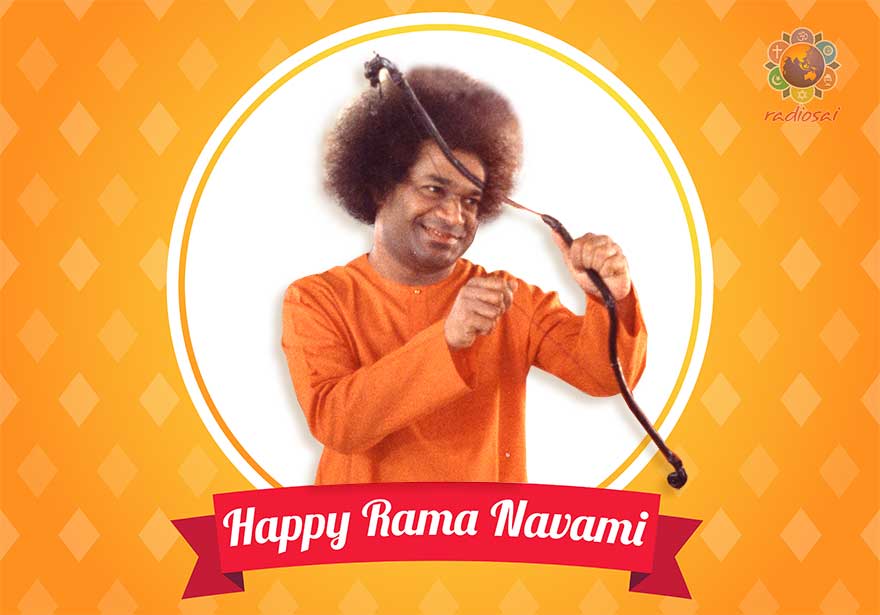 |
Your Destiny is the Country's Future
Only one word, that is the dictum of Rama. 'One word, one wife, one arrow' - these are the characteristic signs of Rama. He is the indweller in our hearts, the Atma is Rama. The principle of Rama has to be achieved this way. We need not follow the principles of some Dasaratha’s son, we must follow our heart, we must follow our conscience. If you are such a fool who cannot satisfy your own conscience, whom else will you be able to satisfy? Pleasing God is nothing but, pleasing your own conscience. So, one needs to follow Sathya and Dharma, and propagate, preach and practice them in their lives.
Students! Boys and girls! In future, you are the ones who would be taking up the roles of leadership in this country. The future of this country is based on your destiny. As you are, so would be the country. Aspiring for the welfare of this country, wishing for auspiciousness for the world, focusing on the benefit of the world, we must to follow God’s command however difficult it may be. We need to follow His command without going astray. That is good for you, for the society and the country. Then alone our prayers, “Loka Samasta Sukhino Bhavantu (May all beings in the world be happy)” would be answered.
(Summer Course, May 29, 1996)
Prema Mudita Manase Kaho Rama Rama Ram in Bhagawan's Voice
- Radio Sai Team
| comments powered by Disqus |






